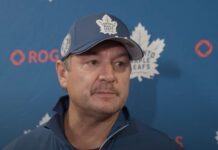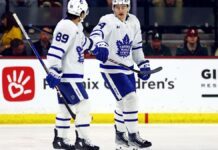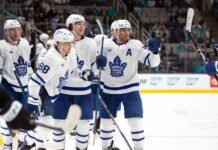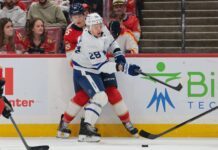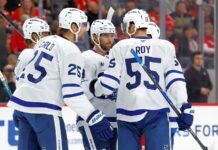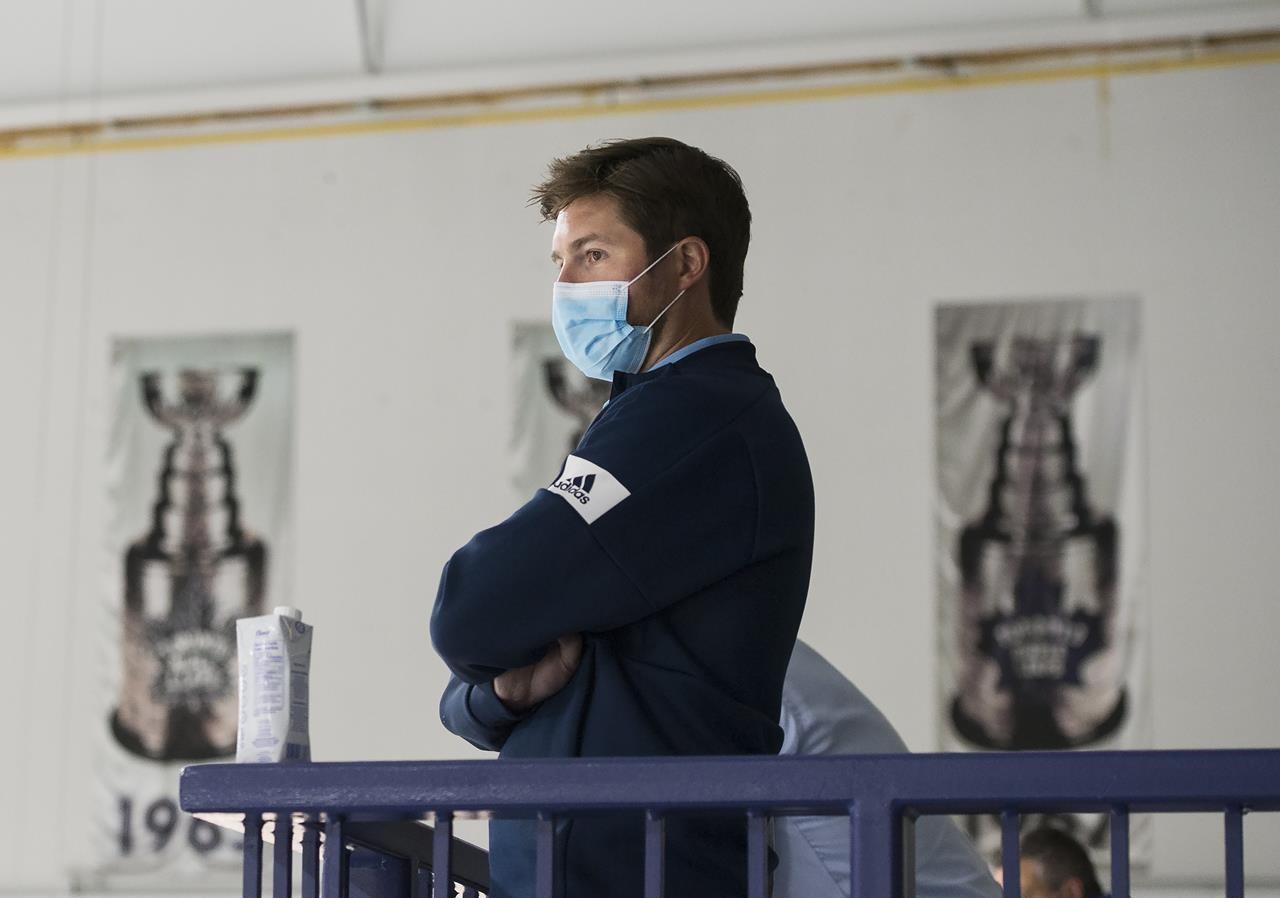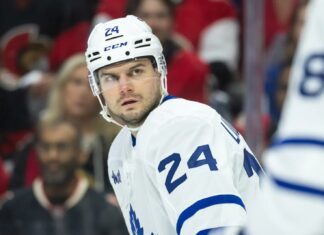In his end-of-season media address, GM Kyle Dubas discussed where the series went wrong against Montreal, how his team can get over the playoff hump, his confidence in his roster construction around the Big Four, the expansion draft, and the plan for Morgan Rielly (entering the final year of his contract) as well as pending UFAs Zach Hyman, Jason Spezza, Alex Galchenyuk, and Frederik Andersen.
What went wrong in the series in your mind?
Dubas: I am still digesting it. Obviously, we had the chance to close out the series three times. You can try to sum up the entirety of it with one word or one description, but I think all three of the games were different.
In Game 5, we came all the way back after being down 3-0, which I thought was a great sign, obviously. We were at home with the chance to close it out. We had lots of chances at the end of regulation and didn’t. On their first chance in overtime, they obviously converted.
In Game 6, certainly at the beginning of the game, that was probably the most disappointed I was up until that point in the series in us. After we settled and found ourselves, especially after they made it 2-0 in the third, we really started to pour it on, tied the game, and really controlled the run of play through overtime.
At that point, it was the best I’d seen from our team with the chance to close somebody out in terms of the way we were playing. We had plenty of chances in overtime and couldn’t put one past. On their second shot in overtime, they scored on a deflection from the slot past Jack. That is the way it goes.
In Game 7, I thought the way Sheldon described it was that both teams were cautious. For me, the common theme looking back over it: In those games when we had the chance to close it out, it’s simply finding our rhythm, playing the way we are designed and need to play, and exerting that on the opposition.
We have had our lessons over the years here. The lessons are repeated until they are learned. I think we are getting to that point now.
Auston Matthews and Mitch Marner have taken a lot of heat in the aftermath of this. How frustrating is it to see them combine for one goal in seven games? Where do you go from here with them?
Dubas: I think disposing of two players of their calibre because the puck didn’t go in the net for them in a seven-game series… I think if after the fourth game you weren’t super critical of them, to go after the seventh game and turn on them, from a management perspective, would be foolish.
I understand the fans can feel any way they want. Media are entitled to feel the way they want. But these are two awfully great young players who showed over the entire regular season what they are capable of. Each has had success in the playoffs previously.
In the first two years here, Mitch was one of our best players in the playoffs against Washington and Boston. He has shown he has done it before — producing — and he makes such a big impact in other areas of the rink: on the penalty kill, defensively, etc.
I have tremendous belief in both of them. They have shown everybody what they are capable of over time. I know, as we continue to go through these seasons and playoffs, the story will be different for them in the future in terms of the way people speak about them following the playoffs.
I have no doubt that as we progress this journey with our group, the way they are viewed as playoff performers will be much different in the future.
All of the things you have done to support the players and get them in a good spot — anything from the preparation they go through, the training, the nutrition, the psychological help, the R&D staff — haven’t worked. How much faith do you have in the system that you have in place?
Dubas: In terms of investing in mental health, in terms of player development, those are aspects that are about the people… I don’t think that is an area that you ever subtract from. You continue to add to it and continue to move things in that direction to get the best out of every individual.
I certainly understand that people are entitled to look at the operation and say that we haven’t won a Stanley Cup to this point. We are open to criticism. That criticism should, can, and will come to me. But I have full belief that the best days for this journey and this program are ahead of us.
If we continue to invest in our people and our players with player development, in their wellbeing, in their performance, we will win here. It is just a matter of sticking to it — especially now, when the criticism is at its highest and conviction is most important.
Everyone seems to be coming back from what Brendan Shanahan indicated. What do you anticipate your summer is going to look like?
Dubas: For me, regardless of how it would’ve ended, you are always trying to review how you can improve the group, make it better, and continue to sustain it — not just rest on what you are doing. There is no reason for us to rest on what we are doing because it hasn’t worked yet.
The onus is on us to continue. Last summer, we adapted and tried to add different elements to the group and continue to have a deep look at where we went wrong in the last three games of the series — after a really good regular season and a good start to the series — and how to rectify it moving forward.
That would be what all of my time was spent on so far and what all of my time will be spent on moving ahead: doing everything that I possibly can to help support Sheldon, the coaching staff, and all of our departments as we get ready for the offseason and 2021-22.
A lot of the depth you added were older players. As you look to fill some of those roles again moving forward, do you want to go with as much experience, or younger and faster types of players?
Dubas: It is a good question. We will take a look at where we are at after. I don’t mean to come across the wrong way, but we are just trying to add as many good players as we can to the lineup.
I get it. Last year, during the summer, we added Vesey, Boyd, Simmonds, Thornton, and brought Spezza back again. The focus largely goes to the older group because they are more veteran players with a greater profile. During the year, we added Galchenyuk to the mix as well in terms of depth. We did have a mix, but I understand a lot of the attention goes to Joe and Wayne because of their pedigree and accomplishments.
Every single year is different. I think those players added a lot to the group here with their play and with what they brought to the locker room. We will go back at it again this summer. Really, we are just trying to make the club as strong as possible knowing we have to dance around the margins with the salary cap situation.
That is really where we will be judged as we head into next season: Can we take what we have and continue to build it out and show tangible strides next season?
What continues to give you faith and confidence that spending so much on four forwards can work, especially now that we are living in a flat-cap world?
Dubas: It hasn’t happened all at once yet. I understand, as we sit here today, why there is scrutiny around that. I understand why there is scrutiny around it at large. Pittsburgh, when they won in 2009, had a similar percentage to their top four players, but they weren’t all forwards. I understand the question marks around it here.
I just really believe in all four of them as people. I thought William, this season in the playoffs, showed tremendous growth. John, as the year went on… It wasn’t an easy start for him. He was playing a different role as Auston assumed that primary number-one center role. John was excellent defensively, found his rhythm as the year went on, and was performing at around his career levels offensively as well to give us a great piece in that regard in addition to what he already does and has done in the previous two years.
Auston won the Rocket Richard Trophy, and Mitch was in the top five in the league in scoring. I just think the reality is that three of the four are still very young in their career. I have a deep belief in their talent but also in them as people — in particular, how much playing here means to them and what winning here will mean to them.
That is really where my belief stands with them. I totally understand the questions and the skepticism at large. Until we do it, I think it is a fair criticism to levy towards me.
It seems like with piece after piece, you went out and fixed the team’s needs. Having done all of that, with Brodie, Bogosian and so many other guys having the years they had, how stunned are you to be standing here today, talking about the playoffs being over after one round?
Dubas: It is very disappointing to be here today. A week ago today, we were up 3-1 coming home with three chances to end the series. A week ago, I think everybody felt great. The mood and the hope and the optimism were extremely high. It is just another very painful lesson.
We are always trying to add to the team, improve it, figure out what the needs are, adapt, and adjust. That is what we will do again, whether it is this upcoming summer’s TJ Brodie or Zach Bogosian. Until we get to that point, the blame lies with me to continue to push, help our coaching staff, and help our scouting staff find the pieces that are going to help us break through in the end. That is what we will set out to do this summer again.
It is extremely disappointing to be sitting here today.
In light of keeping the core guys together, is there something you think you will need to do differently around the margins of the roster?
Dubas: I think there is always going to be regardless of what the end result is. I’ve tried not to take a stubborn, one-way approach to it. You are trying to balance the talent level of the group with experience, competitiveness, grit, production, and all of the objective and subjective things that go into building the roster.
Trying to find and strike the perfect balance is going to be the key, and making sure that when we get into these moments again, we are playing the way we are fully capable of playing. Next year, we are going to be back — I hope — into the regular Atlantic Division. You are back in with Boston, Tampa, Montreal, Florida was in the top five in the league this year, Ottawa on the rise as well, and Buffalo and Detroit coming along.
We have challenges ahead that we need to face at full speed in order to be at our best. I certainly try not to take a stubborn approach to it. The goal will be to build as good of a team as possible next year knowing we are fortunate to have a talented core group.
You have many potential UFAs this summer. Is the priority to get Zach Hyman back? Is Jason Spezza on the list for you as well?
Dubas: I don’t know how many most teams would have each year. We kind of went with the one-year contracts last year. It is nice to have the contract slots to be able to be flexible. We also saw the market last year and there will be similar opportunities this year.
I don’t think we need to get into what Zach Hyman means to the club. He has been an excellent player since he arrived here in 2015 and equally as impressive of a person if not more. He comes in every day, puts it all on the line for the team, and we feel very fortunate to have him. He is someone we will certainly work to bring back. Brandon Pridham and Todd Reynolds will work at that to see if they can get it across the line. It is a big opportunity for Zach and a big decision for us as well. We will get to work on that here.
With regards to Jason, I think it will be a discussion with Sheldon. With players that are at that stage in their career, you always want to make sure that the coach is comfortable, as we have done with Jason in the past. I would expect that if Sheldon is good, we would want to bring him back for sure.
Is the expansion draft a factor with when you can get them signed?
Dubas: I think if we can get them signed, we will handle the expansion question thereafter. I am not going to get into it. I don’t think our expansion equation is overly perilous to the point where signing somebody who deserves to be signed would have a big impact. If we can get those done, we will.
The other thing that comes into it: On July 15 or 16 — the exact date escapes me — if you are a pending free agent, Seattle also has the right to engage in contract talks and potentially sign and then select. It is another team to provide leverage to the players. I don’t know how much interest they will have without having conversations with Ronnie and the Kraken.
It seems like the desire to be a Leaf is as strong as it has ever been — Foligno, Simmonds, and Thornton joining Spezza and Tavares. All are local area guys. It seems to be an advantage and something you helped cultivate as a crucial part of the program. With some of the outrage in the market at the moment, is there any concern it might reverse to the point where players are actively avoiding home?
Dubas: I am not sure. I know we signed those players who were from Toronto or the area in the case of Thornton and Simmonds. We also signed guys that were from all over the place.
The thing that is attractive about playing here is who you get to play with. The hope is that when the next season comes along and you are a free agent, you look at the roster, see what the opportunity is, and you see that you can make the difference by playing with Auston, Mitch, John, William, or Alex Kerfoot, Mikheyev, Jason Spezza on the fourth line, and the defense the way it is. That is really what makes players feel hope.
Any player who is a professional athlete looks at it and knows that when we do overcome the challenges that we face and have stumbled on in the past, it is going to be one of the most memorable wins left remaining. I think players want to be a part of that.
I don’t really know about the social media fury that is out there. I think it comes with the territory. With any team of this nature in this sport — and it is far, far less than what football players in Europe face on a daily basis — I think it is normal. For people from here or Montreal or different markets like that in hockey — and all throughout North America in professional — I think it is part of it.
In the end, it is still home. It would be special for anybody to be able to deliver a winner here at home.
Both of your goalies had wear and tear throughout the season. You are definitely pleased with the progress of Jack Campbell this season. What are your plans for goaltending for next season?
Dubas: With Jack, that is the key — he has to take the summer to… Jack is the type of person that is going to work from sun up to sundown. We have to help him manage and maybe temper him a bit, which is a great problem to have.
A lot of the time, when it comes to performance, strength, and conditioning, the problem is trying to drag guys into the facility that don’t want to be there. The work ethic is low. In his case, he has probably the greatest work ethic of anybody I have seen.
It is trying to temper that, have him become more efficient, and set his body up to go through a full 82-game season as a primary goaltender in the NHL. Obviously, we need that as well — for him to perform at the level he has shown he is capable of but also be healthy and be ready to roll.
The second part of that is something where I put the blame on myself. From watching Fred over the five years, I know there are goalies who do it and are a little bit younger perhaps, but I thought Fred did so much for us and took on so many minutes for us. It was one of the reasons we went out and got Jack. It just so happened Fred was injured shortly thereafter and was obviously injured this year.
I don’t know if the two are related, but the lesson is that we have to go out and continually find somebody that can be a good partner — whether that is Fred returning or somebody else. We have Michael Hutchinson here as well, who had a great season for us. It is making sure we are bolstered on that end to set the goalies up for success.
Do you have any regrets looking back at the last six months?
Dubas: You always do when you get to this point and you haven’t met the goal. You have a goal you think you are capable of, and then you go through the regular season, and the regular season either confirms that you are capable of it or shows you still have a lot of work to do.
This season’s team, when we had ruts — and we had two of them where we lost four, five, or six in a row — was able to fully stabilize itself, go on a run back the other way, and build off of it. I thought it was the best sign I had seen from one of our teams in the regular season. That led me to believe that when we got into these moments that we just went through in the last six or seven days, we would be able to capitalize.
Do I regret anything in the last six months? I regret that we weren’t able to deliver on the promise and hope that our regular season instilled in our fan base. It is up to us to rectify that so we don’t sit here again and deal with that.
As a General Manager, how difficult is it to manufacture the killer-instinct mentality? Is it a matter of being literalist and finding more guys with Stanley Cup rings to join the team, or is it a matter of hoping to develop it from within?
Dubas: It is an interesting question. It always gets brought up. And not even that it gets brought up — I wonder about it. If you don’t have guys that have won, how are the other players… You are never going to have 20 guys who have won before unless you are literally returning a full team. Even Tampa brought in some different guys who hadn’t [won].
It is a great question that I often ponder. On our team, we have some guys who have won, but if you go back to the previous couple of winners, they didn’t really have players that had previously won before. In fact, they had a group that had been through major disappointment.
I have bounced back and forth in terms of, “Do you need four or five or six guys who have won? Do you need guys who are desperate to win and can instill that extra push in bigger games?” I think the reality is that the answer probably lies within the room right now and finding a way, when we are in those big moments, to continue to play the way we were meant to play — not reverting to safe or “cautious,” which is the word Sheldon has used in the last couple of days, but asserting ourselves, going for it, and playing on our toes versus sitting back, waiting, and playing counter-attack type of hockey.
That is really, to me, what I see. I have been here now for seven years. We have made the playoffs for the last five. I have seen the group after elimination each time. This was the most — by far — devastated I have seen the group. In talking in the last couple of days to people in different sports or people in hockey that have guided their team through moments of this onto winning championships, unfortunately — and I know it is not what people want to hear — moments like this are a part of the story that preludes success most of the time.
That is what I believe and I am banking on here as we guide this ship ahead.
What is your interest level in bringing back Alex Galchenyuk, Zach Bogosian, and Frederik Andersen? How much are you counting on Marlies or prospects from Europe pushing for spots next year?
Dubas: With Zach [Hyman] we have discussed him at length. There is no bones about the fact that we would be very interested in having him back. It has to work out fairly for both sides. Zach is going to want to be treated fairly. We are going to have to figure out something that works in the short or long term. That will be up to Brandon Pridham and Todd Reynolds to sort that out.
With regards to Fred, it is so tough to look at this year because it is fresh. He has been such an important part, as I told him today. When he came in here, the team hadn’t made the playoffs. I know it hasn’t had the success that we all wanted to have in terms of winning the Stanley Cup, but without Fred stabilizing things in the crease for us in 2016-17, I don’t know that you know where you are at. I know the situation before was unstable, and it is a difficult sport to play when you are not getting consistency in that position. Fred brought that for us.
With the way this year has gone, Jack has taken significant steps and is signed next year. He has one year left on his contract. We have that already done. With Fred, if there is something that can be done, I would say there is interest on our side as well. It is just probably a different discussion than would have been had before the year. Brandon and Claude Lemieux will have that.
We know we will have to add somebody in net to complement Jack and Michael Hutchinson. We signed Erik Kallgren. We have Ian Scott. In order to address the full need there, we are going to have to add somebody.
Galchenyuk — it was a great story. He came in as a player who had never played in the American League as a top-three overall pick. He came in, put in a ton of work with the development staff, just absolutely worked his butt off every day, and contributed to our group. He came in in the playoffs, produced, had a great game in Montreal in Game 4, and credit to him for that. It is just so fresh with him — he hasn’t been here for long — but there is definitely some interest in having him return.
Morgan Rielly has a year left on his deal. How do you think you will approach his situation? Is it possible you will try to extend him a year out, or will you see how it goes?
Dubas: We haven’t had much discussion on that yet. Morgan is a huge part of what we do here. As with the aforementioned names in Jack and Fred, with the salary cap situation and different things brought on by the pandemic — on the league’s side and PA’s side to get it up and rolling — it is going to be a flat cap. It is probably a little bit slower on extensions. Throughout the league this year, there was a lot of going all the way to the end with it — with key players and captains on some great teams.
You never want to do that if you don’t have to with guys that are a key part of your team. I think patience is a good thing. That said, we will investigate it here as we go onto the summer. We will definitely have a conversation with JP about where they may be at and what Morgan may want to do.

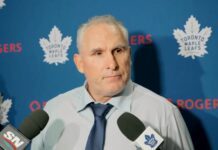


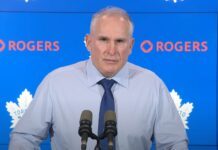

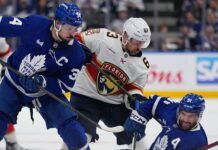



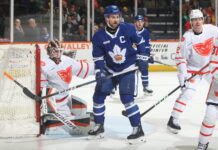


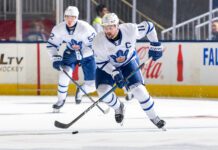
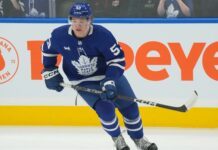
![John Gruden after the Leafs prospects’ 4-1 win over Montreal: “[Vyacheslav Peksa] looked really comfortable in the net… We wouldn’t have won without him” John Gruden, head coach of the Toronto Marlies](https://mapleleafshotstove.com/wp-content/uploads/2025/09/gruden-post-game-sep-14-218x150.jpg)

